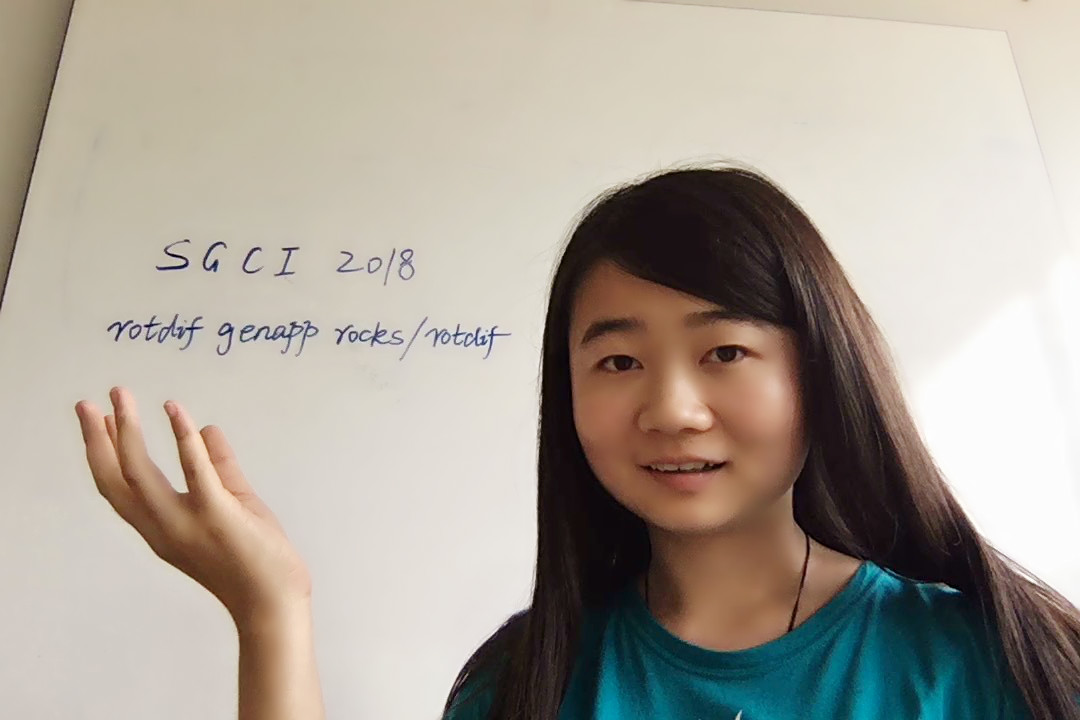2018 Summer Internship Reports: Yuexi Chen
- Details
- Parent Category: blog
- Published on Sunday, 26 August 2018 16:00
Each year, our Workforce Development team offers summer internships for students interested in developing their gateway development skills. Eligible participants are placed at one of several SGCI partner sites. We will be sharing some of the experiences of our 2018 student interns in a series of blog posts entitled SGCI Summer Internship Reports.
Featured below is SGCI summer intern Yuexi Chen, a Ph.D. candidate at the University of Maryland, College Park.
Tell us a little bit about yourself, including what you are studying.
 My name is Yuexi (Tracy) Chen. I come from Sichuan province, China. I received my bachelor’s degree from the University of Science and Technology of China (USTC) in June 2017. Currently, I’m a rising second-year Ph.D. student at the University of Maryland. My principal advisor is Prof. David Fushman at the Department of Chemistry and Biochemistry and I’m also co-advised by Prof. Max Leiserson at the Department of Computer Science. I’m working on developing algorithms and programs for biologists and biochemists to better analyze data and provide insights in designing experiments.
My name is Yuexi (Tracy) Chen. I come from Sichuan province, China. I received my bachelor’s degree from the University of Science and Technology of China (USTC) in June 2017. Currently, I’m a rising second-year Ph.D. student at the University of Maryland. My principal advisor is Prof. David Fushman at the Department of Chemistry and Biochemistry and I’m also co-advised by Prof. Max Leiserson at the Department of Computer Science. I’m working on developing algorithms and programs for biologists and biochemists to better analyze data and provide insights in designing experiments.
Where did your internship take place, and who did you work with?
I worked at the University of Maryland with Prof. Fushman as a software developer for the ROTDIF (rotational diffusion) program. In the process of developing ROTDIF, Dr. Emre Brookes and Dr. Alexey Savelyev at the University of Texas, San Antonio also provided many suggestions and technical support. ROTDIF is a versatile software package that enables researchers to perform accurate and comprehensive analysis of Nuclear Magnetic Resonance (NMR) relaxation data in order to determine the rotational diffusion tensors and characterize the amplitudes and time scales of internal motions in biological macromolecules (proteins and nucleic acids). It also includes powerful tools for ab initio prediction of rotational diffusion tensors from macromolecular structures and for building macromolecular complexes using diffusion-guided docking.
What are some things that you learned as a result of this internship?
My programming background is in scientific computing, so I used to rely on Python and MATLAB in the past. In the past summer, I still used Python to write wrapper files in GenApp modules, but I learned new skills to manage large projects. I also obtained rich experience in web developing in JavaScript/HTML/CSS and user-interface designs, which I had hardly had a chance to be exposed to. It’s really an exciting internship, and I have achieved more than I expected.
Do you see yourself engaging with SGCI again in the future? Perhaps when you begin your career?
Yes, I’m excited about the mission of SGCI. Since I have worked closely with both experimentalists and software developers, I totally understand why we need a better scientific computing environment for experience and data sharing. I’m glad to see SGCI has made great progress in creating such an environment. I hope to continue to be a part of the SGCI community because I enjoy working in a highly interdisciplinary environment with experimentalists, software developers, and computer scientists.
Anything else to add about your internship experience?
I want to add something less technical. At the end of our internships, SGCI staff asked all interns to update our LinkedIn profiles to include SGCI experience. I noticed that we don’t have a logo for SGCI in LinkedIn, so I asked whether they can add a logo. I was surprised by the prompt response and the enthusiasm of SGCI staff. It turned that they uploaded a logo before but it can’t appear for the time being because of LinkedIn’s issues. Now the logo appears again on LinkedIn. In the whole process, I felt well respected and I was inspired by the dedication of SGCI staff to their work.